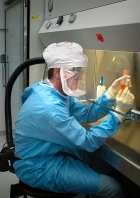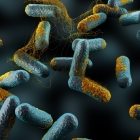Press monitoring
Engineered proteins calm cytokine storms caused by severe infections
17.4.2020 | Press monitoring
When it’s working properly, the immune system is a powerful ally to keep us healthy – but when it turns against us, the results can be devastating. A “cytokine storm” is a dangerous kind of immune overreaction that can be triggered by infection or other treatments. Now, MIT researchers have engineered proteins that show early promise in mopping up...
Research uncovers microbial life in radioactive waste storage sites
15.4.2020 | Press monitoring
Two new research papers from The University of Manchester, working with colleagues at Sellafield Limited and the National Nuclear Laboratory show that microbes can actively colonize some of the most intensively radioactive waste storage sites in Europe. When nuclear facilities such as Sellafield were designed and built more than 50 years ago, it...
Researchers create unique DNA biosensor for early stage disease detection
13.4.2020 | Press monitoring
Disease detection at an early stage is one of the biggest challenges biochemists and materials scientists are trying to meet by combining their expertise at Missouri S&T. The researchers used nanotechnology in biomedical diagnostics – a process called nanodiagnostics – to create a new, ultrasensitive DNA biosensor. The new sensor could...
DARPA program looks to use biotech to prevent jet lag and diarrhea
10.4.2020 | Press monitoring
DARPA is planning to develop a travel adapter for the human body. Called the ADvanced Acclimation and Protection Tool for Environmental Readiness (ADAPTER), the new program aims to produce an implantable or ingestible bioelectronic device to help soldiers handle jet lag and diarrhea. This is bad enough for tourists or business people, but for...
Polio, measles, other diseases set to surge as COVID-19 forces suspension of vaccination campaigns
8.4.2020 | Press monitoring
Global Polio Eradication Initiative on 24 March recommended suspending polio vaccination campaigns until the second half of the year. Two days later Strategic Advisory Group of Experts on Immunization (SAGE) issued a broader call, recommending that all preventive mass vaccination campaigns for other diseases be postponed. But experts say the...
Sea sponge molecule stops cervical cancer cell growth in the lab
6.4.2020 | Press monitoring
Scientists at the University of South Carolina have been investigating the cancer-fighting potential of sea sponges for some time, uncovering compounds that proved effective in tackling melanomas, prostate and pancreatic cancers. Their latest work centers on cervical cancer, the fourth most common cancer type among women, with 13,800 new...
Heart attack on a chip: Scientists model conditions of ischemia on a microfluidic device
3.4.2020 | Press monitoring
Researchers led by biomedical engineers at Tufts University invented a microfluidic chip containing cardiac cells that is capable of mimicking hypoxic conditions following a heart attack – specifically when an artery is blocked in the heart and then unblocked after treatment. The chip contains multiplexed arrays of electronic sensors placed...
Tens of thousands of scientists are redeploying to fight coronavirus
1.4.2020 | Press monitoring
As labs shut down around the world, researchers are finding creative ways to donate their time, supplies and expertise. Working around the clock, scientists at the Broad Institute of MIT and Harvard in Cambridge, Massachusetts can run about 2,000 COVID-19 tests per day. In places where testing is still scarce – which is to say much of the world –...
Scientists identify microbe that could help degrade polyurethane-based plastics
30.3.2020 | Press monitoring
German researchers report that they have identified and characterized a strain of bacteria capable of degrading some of the chemical building blocks of polyurethane. In 2015, polyurethane products alone accounted for 3.5 million tons of the plastics produced in Europe. Polyurethane is used in everything from refrigerators and buildings to...
3-D printed sensors could make breath tests for diabetes possible
27.3.2020 | Press monitoring
The production of highly sensitive sensors is a complex process: It requires many steps and the almost dust-free environment of special cleanrooms. A research team from Materials Science at Kiel University (CAU) and from Biomedical Engineering at the Technical University of Moldova has now developed a procedure to produce extremely sensitive and...
































